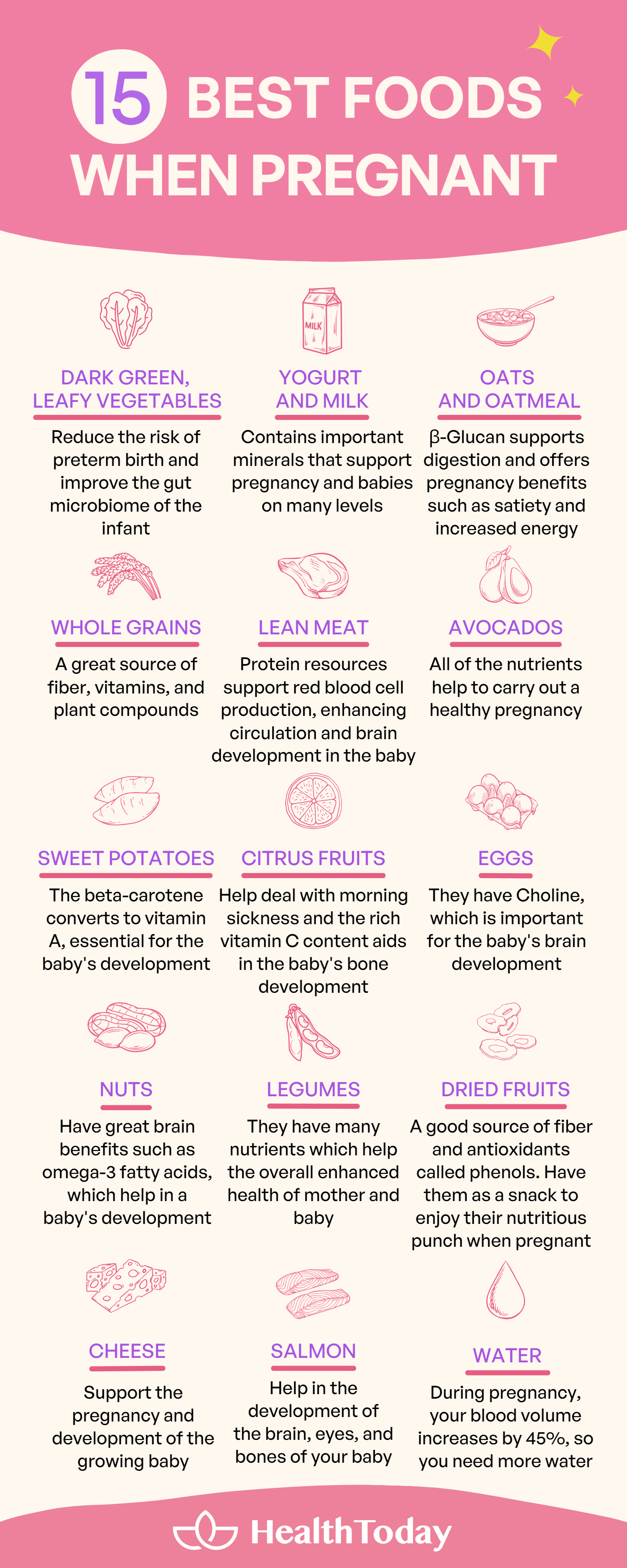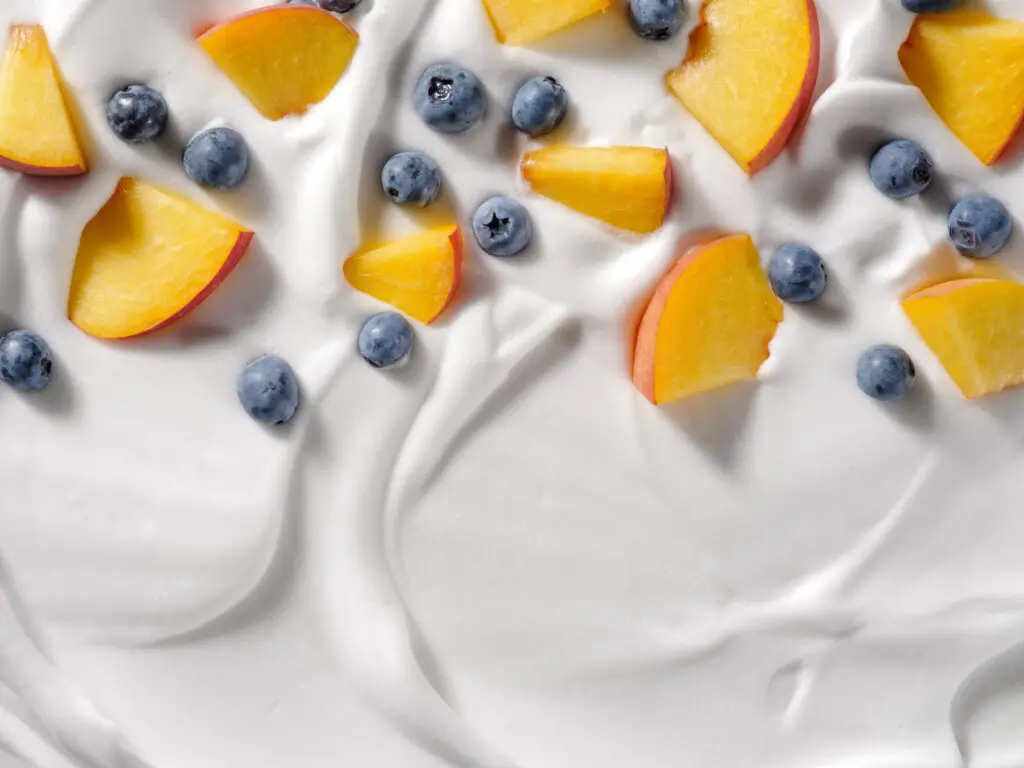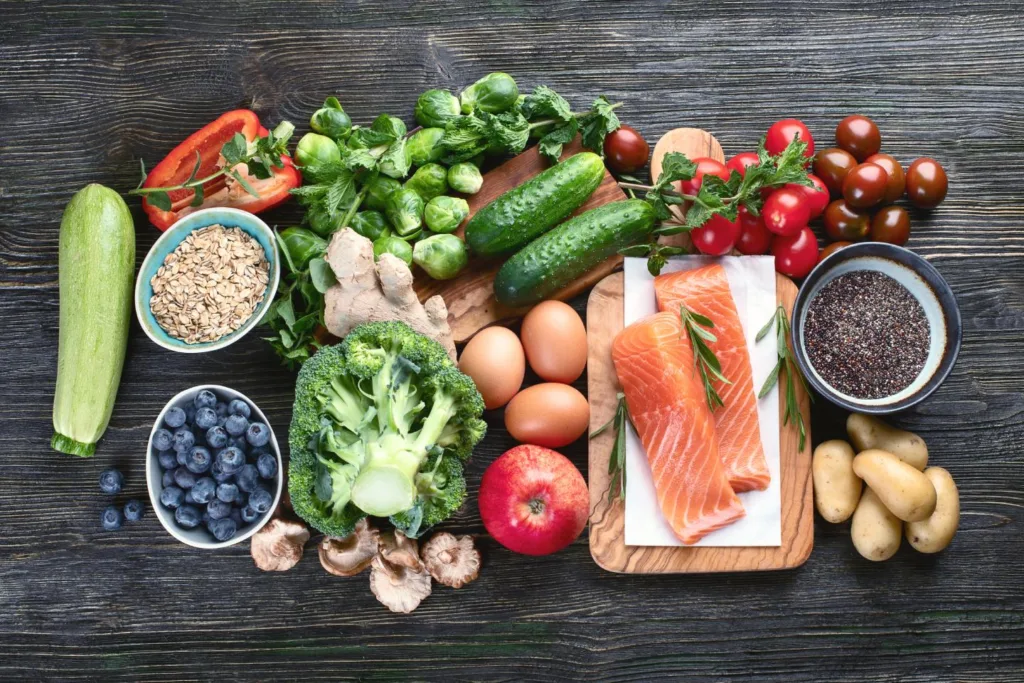Table of Contents
Pregnancy is a beautiful journey that is unique for everyone. But one common thing is that you can boost the baby’s development with good nutrition. Like anyone, your diet should have complex carbohydrates, good fats, lean protein, fiber, vitamins, and minerals.
At this phase, parents-to-be usually pay much more attention to nutrition than ever before. Here are 15 top foods to eat when pregnant for you and your baby and other important information to assist you.
What to eat when pregnant
In pregnancy, your body supports the baby’s health and development (1). Also, you need the required nutrition to carry out a healthy pregnancy. Therefore, there is a need for approximately 300 extra calories each day (2).
Alternatively, you can consider the three different pregnancy trimesters. Usually, no extra calories are needed during the first trimester. During the second trimester, an additional 200-400 calories per day may be necessary. During the third trimester, an additional 400 calories per day may be required (3).
Also, your healthy diet should have all the macro and micronutrients that aid in developing various organs in the baby (4). Nutrition in pregnancy is very important; therefore, It’s wonderful to make your diet balanced to support both you and your growing baby (5).
Here are some important vitamins and minerals you should add to your diet:
Folate or folic acid
Folate is the natural form of vitamin B9 (6). It’s an important nutrient that prevents neural tube defects in the fetus (7). It is sourced as folic acid from supplements or fortified foods. Also, folic acid shows a decrease in preterm birth and low weight in babies (8, 9).
The demand for folic acid increases in pregnancy due to its role in nucleic acid synthesis. Therefore, your healthcare may suggest 600 micrograms of folate or folic acid daily throughout pregnancy (10). To add it to your diet, you can source it from fortified cereals, dark green leafy vegetables, citrus fruits, dried beans, peas, and lentils (6).
Note: Your doctor may suggest you take prenatal folic acid vitamins if you are trying to conceive(11).
Calcium
Calcium helps you stay healthy during pregnancy (12). Also, it helps in the formation of the bones of the baby (13). Moreover, it aids in developing the muscular and nervous systems(14).
You may need 1,200 milligrams (mg) daily during pregnancy to support your and your baby’s health (15). Some good sources of calcium are dairy products, kale, chia seeds, and calcium-fortified foods (16).
Vitamin D
Vitamin D helps form a baby’s bones and teeth (17). During pregnancy, you may have 600 IU/day of vitamin D3. Some good sources of vitamin D are fatty fish, salmon, fortified milk, fortified orange juice, etc (18).
Iron
Iron is essential in pregnancy. It makes hemoglobin, a protein that carries oxygen in the red blood cells (19). It helps to create more blood to supply oxygen to your baby (20).
Therefore, a pregnant female needs 27 milligrams of Iron daily (21).
Its deficiency may cause iron deficiency anemia, headaches, fatigue, and other conditions (22). Also, its deficiency may lead to preterm birth, low birth weight babies, and postpartum depression (23, 24). Some good sources of Iron are lean red meat, poultry, oyster, clam, iron-fortified breakfast cereals, beans, and vegetables (25).
DHA (omega-3 fatty acid)
DHA is a kind of omega-3 fatty acid important for your baby’s brain development (26). The DHA can naturally be sourced from cold-water fish such as salmon, tuna, sardines, anchovies, and herring (27).
But, you must be cautious about mercury content as it can be harmful (28). Always choose low-mercury fish like anchovies, Atlantic mackerel, catfish, salmon etc (29). Some of the high mercury-content fishes to avoid are sharks, swordfish, king mackerel, etc. (29). Pregnant women should have at least 200 mg of DHA daily (31).
Iodine
Iodine is an important mineral that helps develop a baby’s brain and nerves (32). WHO recommends 250 mcg/day during pregnancy and lactation (33). Some good sources of Iodine are seaweed, dairy products, iodized salt, etc (34).
These important nutrients are good for the baby’s overall development. Also, it supports the mother’s body to carry the pregnancy. Consult your doctor and include them in your diet through food or supplements.
15 best foods when pregnant

Here are the 15 top foods for pregnant women:
Dark green, leafy vegetables
Dark green leafy vegetables are a dose full of nutrients for expecting mothers. Moreover, all vegetable consumption during pregnancy is linked to a reduced risk of preterm birth (35).
Also, women who eat vegetables have fewer adverse pregnancy outcomes (36). Plus, studies have shown that it improves the gut microbiome of the infant (37). Another benefit of having vegetables is that they help reduce constipation and have good fiber content (38).
Dark green leafy tables are rich in vitamins, minerals, and nutrients to support pregnancy and baby growth.
You can spruce up the vegetables and have them in soups, salads, smoothies, sandwiches, etc. Always remember to wash them thoroughly, and better to blanch them before eating. And, always be sure to use fresh vegetables.
Citrus fruits
All citrus fruits, including oranges, limes, lemons, etc., are great for pregnancy. First, the scent of citrus fruits may help deal with morning sickness (39). Also, the vitamin C content in these fruits may aid in the development of the baby’s bones (40).
Vitamin C and other nutrients in fresh fruits are healthy for you and your baby (41). You can have a single citrus fruit or consult your doctor about its intake.
One of the best ways to have them is raw. Also, you can make juices, add them to salads, etc. Always remember to wash them thoroughly and have fresh citrus fruits.
Salmon
Including salmon in your diet means you welcome omega-3 fatty acids, vitamin D, and protein into your diet (42, 43, 44).
All of these may help in the development of the brain, eyes, and bones of your baby (45),(46). However, take care when consuming seafood, as it can contain high levels of mercury (47). Fortunately, salmon is a safe option. Ensure that it’s fresh and cook it well for best practices.
Also, avoid smoked salmon, as it carries the risk of listeria (48).
You can have it in your diet plan as a salmon sandwich with cooked veggies, etc. On the other hand, if you want to obtain omega-3 fatty acids without consuming non-vegetarian items, you can try fortified foods, flax seeds, or supplements (49, 50).
Whole grains
Whole grains are a great source of fiber, vitamins, and plant compounds (51, 52). It is beneficial for the mother and infant in many ways. You can add oats, quinoa, brown rice, wheat berries, and barley to your diet to have all the nutrients. Also, you can enhance them in cereal bowls, etc.
Lean meat
Lean meat is an excellent source of proteins (53). It also has good amounts of Iron, Choline, and other B vitamins (53). Especially during pregnancy, the need for Iron spikes to fulfill the hemoglobin production in RBC (54). It carries oxygen-rich blood cells to the baby.
So, adding lean meats to your diet is important. The trick is to pair them with veggies and cook them well. Also, to increase your iron absorption, you can have vitamin C-rich food with it (55).
Avocados
Avocados are the creamy delights that are superfoods. They have monounsaturated fatty acids, fiber, antioxidants, B vitamins (especially folate), vitamin K, potassium, E, and C (56). All of this helps to carry out a healthy pregnancy.
Also, folate helps to prevent neural tube defects (7). You can try it as guacamole, in salads, in smoothies, and in other dishes.
Legumes
Legumes like lentils, peas, beans, chickpeas, soybeans, etc., are good sources of fiber for digestion (57),(58). Also, they have many nutrients which help the overall enhanced health of mother and baby. You can try them as hummus on whole grain toast, black beans in a taco salad, or lentil curry.
Yogurt and milk
Dairy products like yogurt and milk are good sources of calcium (59). It’s an important mineral that supports pregnancy and babies at many levels. Greek yogurt, in particular, has good protein, probiotics, B vitamins, phosphorus, and calcium (60, 61). All of these are the best nutrients for staying healthy during pregnancy. Also, if you are lactose intolerant, you can try lactose-free Greek yogurt.
Eggs
Eggs are one of the most easy-to-pair and nutritious foods. They have whole protein, essential fats, vitamins, and minerals (62). Also, they have Choline, which is important for the baby’s brain development (63). You can have boiled, scrambled, sunny-side-up eggs with sandwiches, salads, wraps, and other dishes.
Nuts
Nuts are an instant and delicious source of nutrients. They make a great snack for quick munching during pregnancy. The different sources of nuts have great brain benefits in babies (64).
Also, walnuts have omega-3 fatty acids, which help in a baby’s development (65, 66). Along with them, they are a great source of other nutrients too.
You can add them to your diet as a snack. Also, you can add them to smoothies, cereals, shakes, desserts, etc.
Sweet potatoes
Sweet potatoes are a good source of beta-carotene and fiber (67). The beta-carotene is a safe source of vitamin A (68). In the body, it converts to vitamin A, which A is essential for the baby’s development(69, 70).
A small note of concern is to track the intake of vitamin A, as it can also cause toxicity(70). Sweet potatoes are good for making a healthy snack or breakfast; you can mash them and add them into the milk etc., to enjoy their delicious and nutrient-rich taste.
Dried fruits
Dried fruits are an excellent source of fiber and antioxidants called phenols (71). Also, they have all the nutrients without the water content. You can have them as a snack to enjoy their nutritious punch when pregnant but must be mindful of portion size (71).
Also, choose sugar-free dried fruits, which are much better for you and your baby. You can mix it with trail mix to enjoy quick munching.
For example, you can mix Prunes, which contains good fiber, potassium, and vitamin K (72). Or, try healthy Dates that are rich in fiber, potassium, iron, and plant compounds (73).
These important nutrients make them healthy for pregnant mothers and growing babies.
Cheese
Cheese has vital nutrients like protein, calcium, phosphorus, and vitamin D (74). All of them support the pregnancy and development of the growing baby.
However, you should know which cheese to consume and what to avoid. Some of the cheeses you can have are:
- Hard cheese like cheddar, Parmesan, or Gruyere.
- Pasteurized semi-hard cheese.
If you are considering soft cheese, it must be heated to 74°C (165°F) to ensure it is safe during pregnancy. In sum, when consuming cheese, make sure it is cooked and pasteurized. Unpasteurized cheese can easily increase the risk of bacteria and disease (75). So going through and picking the safe cheese is advisable.
You can add cheese in plenty of ways to your diet. You can layer the dishes with cheese to enhance the taste.
Oats and oatmeal
Oats and oatmeal are one of the best breakfast options for the pregnancy meal plan. It has a good protein level, which is necessary for pregnancy (76). Also, it has beta-glucan, a dietary fiber that is good for digestive issues (77). Moreover, the satiating effect and great energy boost are great.
Also, they are loaded with potassium, selenium, manganese, magnesium, phosphorus, and calcium (78). All these minerals support pregnancies in many ways (79).
You can have oats and oatmeals in cereals, smoothies, or other dishes.
Water
Staying hydrated is important for everyone. But, especially during pregnancy, you need it even more as the blood volume increases by 45% (80). Also, you need enough water to support all the activities in your body and the baby’s development.
The American College of Gynecologists recommends drinking 8–12 cups (64–96 ounces) of water daily during pregnancy (81). But, the need for water also depends on age, health conditions, and activity levels.
You must seek the help of your doctor for the best advice. Stay hydrated to keep away all the symptoms of dehydration and related problems. Moreover, you can keep water reminder alarms, use a bottle with volume marking, etc.
These were the most important 15 foods you can add to your diet. But the right serving and portion size depends upon your BMI, trimester needs, and other health factors. Therefore, you consult your doctor to plan a meal. You can also refer to MyPlate meal planning and get a custom plan according to your specific factors (82).
If you have any disease or feel unwell after eating some food, you should take a doctor’s advice. Also, avoid undercooked and unsafe food during pregnancy. So, try these foods with different ingredients and make a diverse and nutrient-rich diet.
More healthy foods for pregnancy diet
Here are some things to include in a healthy pregnancy diet:
Healthy fats
Healthy fats usually mean unsaturated fats, which are monounsaturated and polyunsaturated fats (83). They are important for everyone as they improve heart health and cholesterol (84).
Also, during pregnancy, it may aid in building a baby’s proper brain and eye development (4). Some of the good sources of good fats are (85):
- Avocado
- Canola oil
- Nuts like almonds, cashews, pecans, and peanuts
- Olive oil and olives (look for low/reduced sodium)
- Peanut butter and peanut oil
- Safflower oil
- High-fat fish
You can gradually switch them with other bad fats(saturated fat) for better health. It’s important not only for pregnant women but also for anyone. However, when focusing on consuming unsaturated fats, be mindful of the omega-6/omega-3 ratio (86, 87). Healthier fats have numerous benefits, and you can gradually switch to them.
Healthy fiber
A fiber-rich food helps pregnant women and the growing fetus in many ways. It improves heart health, decreases diabetes risk, and prevents constipation (88). Also, it reduces preeclampsia risks (89). It is a condition that may occur in the 20th week of pregnancy or after (90). It has conditions like high blood pressure and other complications.
Dietary fiber must be an important part of your daily diet. Some of the great sources of dietary fiber are (91):
- Fruits
- Vegetables
- Whole grains
- Legumes
- Nuts
- Chia seeds
- Brown rice
It’s found in many food items. You must explore and include all the options in your diet as your doctor advises.
Healthy proteins
Protein foods are important to support a healthy pregnancy. Also, it aids in the overall development of the baby (92). You may need 46 to 71 grams (g) of protein per day (93). But it would be best if you sourced it from healthy options like (94):
- Lean meat
- Poultry
- Seafood (watch mercury content)
- Eggs
- Beans
- Peas, nuts, seeds
- Soy products
You can add non-vegetarian and plant-based protein to your diet as your choice. But watch for its daily requirements for the best results.
Complex Carbohydrates
Complex carbohydrates are made from sugar molecules in long, complex chains (95). Moreover, unlike refined carbs, they have more essential vitamins, minerals, and fiber which are good for health (95).
They slowly release sugar to the body, which makes you full for longer. Also, they are nutrition-rich. Moreover, studies recommend having complex carbs during pregnancy for overall health benefits (96).
Some of the good sources of complex carbs are (97):
- Unrefined whole grains
- Brown rice
- Brans
- Seeds
- Fleshy fruit
- Oats
- Broccoli
- Apples
- Lentils
- Spinach
Healthy Vitamins and Minerals
A vitamin and mineral-rich diet is very important in pregnancy (98). Your doctor may also advise additional supplements to fulfill its needs.
Some of the important vitamins and minerals are Vitamin A (retinol), Vitamin B1 (thiamin), Vitamin B2 (riboflavin), Vitamin B3 (niacin), Vitamin B5 (pantothenic acid), Vitamin B6 (pyridoxine), Vitamin B7 (biotin), Vitamin B9 (folate), Vitamin B12 (cobalamin), Vitamin C (ascorbate), Vitamin D (cholecalciferol, Vitamin E (tocopheryl acetate), Vitamin K (phytomenadione), Choline, Calcium, Chromium, Copper, Fluoride, Iodine, Iron Magnesium, Phosphorus, Selenium, Zinc, Potassium, etc (99).
You can source them from (100):
- Fruit and vegetables
- Grains
- Milk and dairy foods
- Meat
- Cereals
- Fish and seafood (watch mercury content)
- Nuts
These were important macro and micronutrient groups that support pregnant women and their babies. You may also source them from non-vegetarian and plant sources. Moreover, consulting your doctor for supplements is necessary.
These important healthy food choices must be added through different sources to your diet. For the portion size or to discuss some issues, you must take advice from your doctor and dietitian. A colorful plate with fresh-sourced nutrients will help throughout the pregnancy.
Summary
During this phase, having a balanced pregnancy diet means a healthy pregnancy and may reduce the chances of birth defects in the baby. You don’t have to stop your cravings, but instead, opt for something healthy. You can choose natural sugars, healthy fats, healthy protein, complex carbohydrates, and many vitamins and minerals.
Make sure you have fresh, washed, and cooked food. It would be best if you avoided any chance of contamination during pregnancy. Your diet should have all the elements paired to fulfill your caloric and nutrient needs.
So, include lots of fresh vegetables, fruits, legumes, lentils, lean protein, seafood, whole grains, and healthy fats. Satisfy all your cravings with healthy options and pair-ups. To help you, here is a quick summary of the foods you can consider:
QUICK TIPS FOR FOODS TO EAT WHEN PREGNANT
- Your daily diet should have many green leafy vegetables like broccoli and kale. They are a great source of fiber, vitamins, and minerals. Have them as side dishes, soups, kinds of pasta, etc.
- Have a good source of dairy products. You can, especially, add yogurt as it has a lot of calcium and protein.
- Add lots of legumes to your diet. They have folate, fiber, and many other nutrients.
- Salmon is a natural source of omega-3 fatty acids and vitamin D. It helps in the development of the brain of the baby. While having fish, consider its mercury content and always choose safe options.
- Sweet potatoes have beta-carotene, which is transformed into Vitamin A. There is a need for vitamin A for the differentiation of cells in your growing baby.
- Eggs are wholesome food that has lots of nutrients. It also has Choline which is good for a baby’s development.
- Dried fruits have lots of nutrients, making them a quick and easy option to satisfy sugar cravings. But avoid too many of them, and choose the sugar-free ones.
- The superfood avocado has monounsaturated fatty acids, fiber, folate, and potassium. All of this helps the expecting mothers and the baby in many ways.
- Add lean meat, which is a healthy protein. You can add beef and pork to your diet to enjoy additional nutrients.
- Whole grains are rich in fiber, vitamins, and plant compounds. This makes them a healthy meal for pregnancy.
- Staying hydrated is one of the most important things during pregnancy. It helps you to avoid many problems like constipation and urinary tract infections. Also, it fulfills the increased blood volume during pregnancy.
So, enjoy your healthy pregnancy diet with these amazing options.

















Comments
0